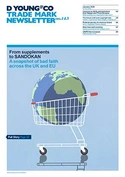UK trade mark appeal dismissed following AI issues: UKIPO cautions litigants
In a recent UKIPO trade mark appeal, questions were raised by the appointed person in relation to the use (or rather mis-use) of artificial intelligence (AI) in preparing arguments.
Issues arose in relation to the skeleton argument and grounds of appeal filed for the appellant by Dr Soufian (who was acting as a litigant in person) and also the skeleton argument filed for the respondent by Mr Victor Caddy (of IAM The Victor LLP).
Dr Soufian had filed his grounds of appeal in narrative form and at the end of the grounds included a list of cases and “quotes”. Despite the cases being real, three of the “quotes” were not found in the decisions cited. The appointed person, Phillip Johnson, concluded that the summary misrepresented the cases substantially. Dr Soufian admitted that he had drafted the grounds with the assistance of ChatGPT and, when addressing the numerous errors in the citations and problems with the skeleton arguments, he apologised unreservedly.
Mr Caddy, who is a trade mark attorney, also had his skeleton argument scrutinised by the appointed person. Three real cases were found to be correctly cited; however, during the hearing, Mr Caddy was unable to identify the part of the judgments which supported the propositions made. After the hearing he sent email to the UKIPO Secretariat in which he said that he had not been expecting to “make out my own side’s case more so than had been done in the skeleton”. The appointed person concluded that this did not improve Mr Caddy’s position and “clearly makes it worse”.
The appointed person cited the case of Ayinde, R (on the application of) v London Borough of Haringey [2025] EWHC 1383 (Admin), in which the Divisional Court had considered the problems arising from advocates using generative AI (including ChatGPT) in preparing court documents. In that case it was said that in the context of legal research, the risks of using AI are now well known. Whilst generative AI tools trained on a large language model (such as ChatGPT) are capable of producing apparently coherent and plausible responses to prompts, it was acknowledged that those coherent and plausible responses may turn out to be entirely incorrect. It was concluded that there are serious implications for the administration of justice and public confidence in the justice system if AI is misused.
The appointed person said that Dr Soufian, despite being a litigant-in-person, was still under a duty not to mislead the court; however, it was noted that a litigant-in person should not be punished for raising irrelevant arguments which are honestly made or putting forward arguments based on genuine misunderstandings of the law. The appointed person noted that there is a difference between honest mistakes and misunderstandings and relying on laws which have been fabricated.
Further, in a nod to UKIPO practice, the appointed person said that it was important that all litigants before the registrar (whether ex parte or inter partes) and all parties to any appeal to the appointed person are made aware of the risks of using AI. He said “a very clear warning needs to be given to make even the most nervous litigant aware of the risks they are taking”. In the future, he said that if a notice warning of the risks of using AI is included in registry correspondence, an apparent lack of experience (in the case of Dr Soufian) is much less likely to be such strong mitigation.
It should be noted that the appointed person did accept that it was possible that Mr Caddy found the references and simply read them (and misunderstood them) in a way that he was unable to follow or understand; however, he highlighted that advocates should always be prepared to explain to a court or tribunal what they have included in skeleton or other written arguments.
In entering into relatively unchartered territory, this case highlights the risks posed by litigants relying on the accuracy of AI without proper checks and verification. Despite the huge potential advantages that AI has, in a brave new world this case serves as a clear warning that human input remains vital.
Case details at a glance
Jurisdiction: UK
Decision level: UKIPO appeal
Parties: Proheath Inc and Pro Health Solutions Ltd
Date: 20 June 2025
Citation: BL O/0559/25
Decision (PDF): dycip.com/ukipo-o055925

